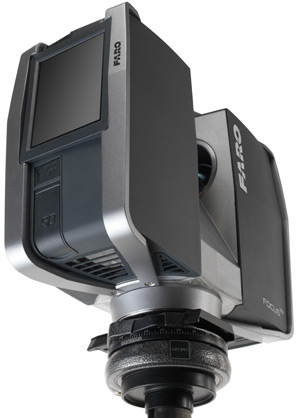In the world of laser scanning there have been four certainties; laser scanners are big, heavy, complicated to use and very expensive. Florida-based manufacturer Faro has just unleashed a revolutionary new scanner to challenge all of those perceptions. Martyn Day reports.
There is little doubt that the laser scanning market is on a very sharp upwards trajectory, as vendors such as Autodesk and Bentley Systems embed core point-cloud technology into the engines of their flagship products. So with wider availability and decreased cost in accessing the tools to capture, edit and use 3D point clouds we should not, perhaps be surprised by innovation in the hardware capture side of the equation.
The cost of laser scanners together with their size and expertise required to use them has limited the accessibility of the technology. As a result, it has to date made better business sense for surveying bureaus to provide services after making the sizeable investment in equipment.
However, as the price and ease of use drops over time, point-cloud data will again benefit from wider availability. With the Focus 3D, Faro, has just taken a considerable step forward in single-handedly doing exactly this.
I first heard there was something ‘exciting’ coming from Autodesk’s CEO, Carl Bass, last year at Autodesk University. With the news of its new point-cloud engine in AutoCAD 2011, he confided that a much cheaper range of scanners would soon be coming out to democratise the industry.
I should have guessed it was Faro, as Autodesk had established close links with the company to help it support scanned data inside AutoCAD. The product at the source of all the excitement was the new Faro Focus 3D laser scanner; it is five times smaller (24cm x 20cm x 10cm), four times lighter (5kg) than the previous generation, and can be operated with just one finger. Without any doubt it is the smallest laser scanner available on the market today and can be comfortably taken on an airplane as hand luggage.
Capabilities
The Focus 3D offers millimetre accuracy and the capability of capturing 976,000 points per second at a range of up to 120 metres. There is a built-in level sensor, together with built-in auto-registration, which results in estimated processing time savings of up to 50 per cent. An innovative touch screen interface provides fast and easy access to all the scan controls.
The icon driven menu system takes a leaf from the iPhone and also reduces training time. The integrated lithium-ion battery provides up to five hours of scanning per battery charge and can be charged during operation. Furthermore, all scans are stored on a standard SD card enabling easy transfer to a computer (Apple Macs have an integrated SD slot).
Each machine comes with a copy of Faro Scene, to view and analyse the 3D point-clouds for collisions and deviations. Scene can also be used to measure distances, surface areas and volumes — great for looking at the evenness of floors and walls and seeing the results in colour. To connect to popular CAD systems such as AutoCAD, Rhino, MicroStation, Geomagic and PolyWorks, Scene offers a range of tools to enable the early stages of ‘Scan to BIM’, in which an intelligent 3D model could be created from the original scanned data.
Colour
Point clouds are just a collection of high density dots having X, Y and Z co-ordinates, however when combined with a photograph, suddenly you have the quickest way of accurately capturing the real world in a CAD system. Typically this has been done with mounting a high-quality (that means expensive) digital camera on top of a scanner and merging the data outputs. Faro’s Focus 3D has a built-in 3 Megapixel colour camera that can simultaneously capture automatically co-ordinated and parallax free images to generate photo realistic scans.
The final point to mention is of course the price, which at around £24,000 per unit represents fairly attractive positioning given the large benefits over the more cumbersome competitive systems.
Conclusion
It is quite rare that in hardware there are significant jumps in capability as each subsequent generation is refined and improved through development. Without doubt, Faro has made a giant leap forward in the traditional technologies to enable such a small, light and easy to use device.
Talking with people in the laser scanning industry, I have heard estimates that Faro is now up to 12 months ahead of its competitors with this new design and is having trouble keeping up with the demand for the Focus 3D already.
It is also worth pointing out that there is an inaugural SPAR laser scanning event happening in Amsterdam between 7-8 December this year. It is the European sister of the highly popular SPAR event held in Houston and is a great place to find out about everything that is new in the industry.
www.faro.com/focus/uk
www.spar-eu.com






